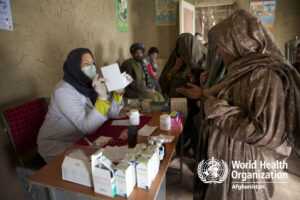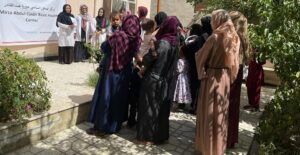21 December 2022, Kabul, Afghanistan – The Government of Italy, via the Italian Agency for Development Cooperation (Pakistan and Afghanistan office), has allocated €6 million to the World Health Organization (WHO) in Afghanistan to improve people’s access to health services in primary and secondary health care facilities in 5 provinces: Hilmand, Kandahar, Nimroz, Zabul and Uruzgan.

Abeda, 35, works as vaccinator at the clinic organized by WHO in Pul-e-Campany refugee camp. Kabul, Afghanistan.
While health care facilities across Afghanistan are closing or facing significant resource shortages, health needs are increasing rapidly.
WHO and its partners continue to deliver health services to ensure that primary and secondary health care services are available to people from under-served communities who are at high risk for infectious diseases like acute watery diarrhoea, measles, respiratory infections and polio.
The complexity and severity of the ongoing humanitarian crisis in Afghanistan has increased the number of people in need of health assistance by 16%, from 24.3 million in 2022 to a projected 28.3 million in 2023. Through the funding received from the Italian Government, WHO will conduct life-saving health interventions at the primary and secondary levels in the southern region of the country to reduce avoidable deaths from disease.
“Italy’s contribution to Afghanistan is crucial for WHO to further strengthen primary and secondary health care services in vulnerable communities,” says Dr Luo Dapeng, WHO Representative in Afghanistan. “This strategic support will also reinforce the preparedness and response capacities of public hospitals for future outbreaks and health emergencies.”
Her Excellency Ms Natalia Quintavalle, Ambassador of Italy to Afghanistan, added, “We are strongly committed to further enhancing health care service delivery in under-served areas for the people of Afghanistan.” She added that, “Italy is committed to working with WHO to enhance health care services and build a healthier future for all Afghans”.
“WHO and the Italian Agency for Development Cooperation – AICS – have longstanding experience of promoting joint projects, with Italian excellence, focusing on providing primary health care services to the people of Afghanistan,” added Mrs Emanuela Benini, Director of the AICS office based in Islamabad.
focusing on providing primary health care services to the people of Afghanistan,” added Mrs Emanuela Benini, Director of the AICS office based in Islamabad.
With the funding from Italy, WHO will support 31 health facilities targeting more than 221 889 beneficiaries from the under-served population. These facilities are spread out across 25 districts and 31 main villages. Moreover, WHO will ensure mainstreaming of gender equity and human rights dimensions across all activities. The focus will be on adopting an equitable approach that leaves no one behind to address multiple vulnerabilities based on gender, age, ethnicity and other social stratifications.
